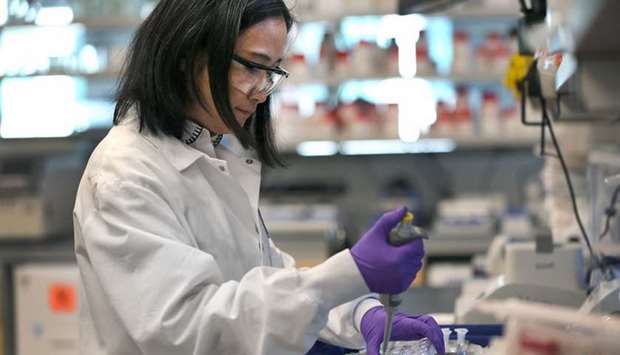The first results from human trials of a vaccine against Covid-19 have given a glimmer of hope after a US firm’s study produced positive results in a group of eight volunteers.
These results — which come a day after the UK government revealed a deal to secure 30mn doses of a rival Oxford University vaccine, should it be successful — showed that each of the participants produced an antibody response on a par with that seen in people who have had the disease. And they suggest that the vaccine is safe for use in humans.
Part of a first-stage trial of 45 people run by the US company Moderna, the results are from a preliminary safety study and do not demonstrate that the treatment will work. But they will be a sign of encouragement for experts and governments desperate for a breakthrough in the battle to bring an end to the coronavirus pandemic — widely believed to be impossible without a vaccine.
Although both programmes are in the early stages, the findings also appear to put the US research ahead of the UK’s. While the Oxford vaccine was shown in a safety study to protect macaque monkeys against pneumonia, it did not stop infection — which could leave people liable to spread the virus, even if they do not get sick themselves.
With the backing of the British government, the Oxford group is partnering with the drug company AstraZeneca to make 30mn doses for the UK — if the vaccine works. It is to receive £65.5mn to fund its work. Imperial College London, which also has a vaccine under development, has been awarded £18.5mn.
In the US study, run by the National Institutes of Allergy and Infectious Diseases, all eight volunteers made neutralising antibodies which were tested in human cells in the lab and stopped the virus from replicating. The higher the vaccine dose, the more antibodies the volunteer produced.
However, as with antibody tests, there will still be questions over whether this response is enough to prevent people from being infected by the virus. This approach does not stimulate another arm of the immune response, from the T-cells. It is also not known whether an antibody response will last.
Many different companies and institutions around the world are racing to develop a vaccine in record time, using different approaches. The World Health Organization has a list of 76 contenders. Moderna was the first in the world into clinical trials with an RNA vaccine, which uses a segment of genetic material from the virus itself, called messenger DNA, to provoke the immune system into making antibodies.
Imperial College is also developing an RNA vaccine, although its approach is different. Robin Shattock, professor of mucosal infection and immunity, who is leading the Imperial trials, said the Moderna findings were encouraging. “While it will be important to scrutinise the actual data, the reported findings are in line with expectations that vaccine candidates should provide levels of neutralising antibodies that are at least equivalent to convalescent subjects,” he said.
“This is a promising start, but efficacy data will be key followed by an ability to scale in a manner that provides global access should this vaccine be successful.”
Stephen Evans, professor of pharmacoepidemiology at the London School of Hygiene & Tropical Medicine, also gave the news a cautious welcome. “Well, it isn’t bad news and there are a number of good points that suggest optimism that this vaccine may work,” he said.
Oxford University has published results of safety trials in macaque monkeys. While the vaccine prevented the monkeys from developing pneumonia, it did not block the virus from infecting the animals.
Jonathan Ball, professor of molecular virology, University of Nottingham, said that the Oxford results were encouraging in that they prevented serious illness, but that if the vaccine works the same way in humans, it may not prevent the spread of disease.
“If this represents infectious virus and a similar thing occurs in humans, then vaccinated people can still be infected, shed large amounts of virus which could potentially spread to others in the community,” he said.
“If the most vulnerable people aren’t protected by the vaccine to the same degree, then this will put them at risk. Therefore, vaccine efficacy in vulnerable populations and the potential for virus shedding in vaccinated people needs very careful monitoring.”
Moderna has so far only released results for the youngest group of volunteers. It intends to press ahead to the next stage of human trials involving 600 people shortly, with a much bigger trial involving thousands set to begin in July.
— The Guardian
“I felt guilty” — volunteer on signing up for vaccine trial
By Ben Quinn
As one of hundreds of volunteers involved in the University of Oxford’s coronavirus vaccine trials, Dan McAteer said he had a few nerves on the day of receiving the jab itself. However, he recalled an unexpected incident from the night before.
“They were well meaning, but a relative shared an online post of what was obviously a piece of fake news claiming that one of the trial participants had died,” said the 23-year-old student.
“It didn’t give me pause to stop in the least, but there was a sort of weird dynamic because it was on Facebook, which had played a role in my recruitment when I saw an original callout for volunteers. In fact it emphasised why the vaccine was so important. You get a sense society is sort of fraying.”
Two weeks have now passed and the fact that a vaccine for the global pandemic could be pulsing through his body (half the study participants get the Covid-19 jab and half get a control one) has largely faded to the back of his mind.
Like others, he will soon have the first of monthly blood tests, but in the meantime has been taking his temperature and logging in online to record any symptoms.
“It’s all very well organised and you’re given emergency contact details if needed, but by the second week you have basically just become a data point in someone else’s spreadsheet,” he said.
If that sounds like a modest assessment of his role in something that could save millions of lives and allow the world to return to some semblance of normality, then he is equally self-effacing about his reasons for taking part.
“I felt guilty, to be honest — aware of the privileges of youth, health, and being able to stay at home,” said McAteer, a postgraduate studying the history of science, medicine and technology at St Edmund Hall, one of the university’s colleges.
“There are thousands of people out there fighting for breath, skewed dramatically by class and race. But there are also thousands of carers, nurses and doctors collapsing with exhaustion at the end of another mega-shift every day. So I thought: my brain is quite useless, maybe my body can help.”
That admiration for healthcare workers also comes through in his invocation of staff he met on the day when the vaccine was administered, comparing them to the generation mustered for the war effort in 1939.
He recalls feeling flattered after arriving on his bicycle when a nurse also participating in the trial mistook him for a young doctor. “No, I’m one the guinea pigs,” he replied at the time.
“For an ancient university, they’ve really kicked into gear at speed. You can tell that things have been put together with urgency, but also that they know what they’re doing. There’s a particular kind of doctor who exudes a gentle, studious authority as they work. There seem to be a fair few of them around. For a small group of medics and scientists, this is like an engineer corps throwing a bridge together in a warzone: fast and methodical.”
McAteer also spoke of medical students who had been enlisted to help across the NHS, encountering one who helped him with some paperwork: “I was struck by how his university life had been turned upside down even more than mine. He should have been on a rotation or cramming for exams, but had instead been deployed to Covid work for the foreseeable future.”
Inside a small room – “just like any other in a doctor’s surgery” – he lay down and was given the injection by a nurse who, like him, didn’t know if it was the vaccine or the control, a well established meningitis vaccine.
“She was one of those really experienced people, who have amazing skill but are also really soothing, one of those people who can just keep conversation going.”
A little over an hour later, after undergoing temperature and other checks, he was on his way home, where he experienced some mild symptoms that evening in line with some of the expected common side effects of vaccines.
“I had a fever, some shivering and a headache the evening of my jab, but this all cleared up within 24 hours. Nothing to fear, in my personal experience.”
Life switched back to a lockdown routine at the house he shares with his girlfriend, in which the need to meet looming academic deadlines have kept boredom at bay.
Like many people, their news consumption has rocketed — although interest in the evening Downing Street briefings has fallen — and he likened the national picture to “a bit of an Oxford psychodrama” involving Chris Whitty, Boris Johnson, Keir Starmer and other alumni.
McAteer has also closely followed coverage of the vaccine trial: “It’s clear that the university has been very upbeat in their communications and Prof Sarah Gilbert, who is leading the project, even publicly floated the idea of being ready by September.”
It’s a degree of optimism that he doesn’t quite share: “September, or October even, feels like a very optimistic scenario.” But he very much wants the vaccine to succeed.
Above all, however, there’s an overarching admiration for those involved in the trial and wider efforts to tackle Covid-19: “We’re talking about people who are getting on with it with calm professionalism and compassion. Some snidely call the NHS a national religion. But I think it’s a pretty good one to have.” — The Guardian

SPOTLIGHT: The Moderna lab in Cambridge, Massachusetts, US, where a coronavirus vaccine is under development.


